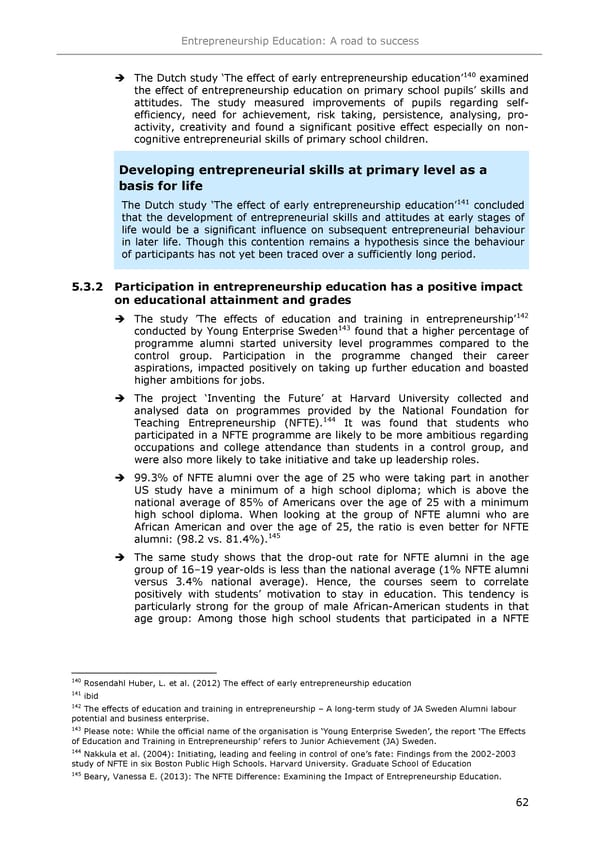Entrepreneurship Education: A road to success 140 The Dutch study 8The effect of early entrepreneurship education9 examined the effect of entrepreneurship education on primary school pupils9 skills and attitudes. The study measured improvements of pupils regarding self- efficiency, need for achievement, risk taking, persistence, analysing, pro- activity, creativity and found a significant positive effect especially on non- cognitive entrepreneurial skills of primary school children. Developing entrepreneurial skills at primary level as a basis for life 141 The Dutch study 8The effect of early entrepreneurship education9 concluded that the development of entrepreneurial skills and attitudes at early stages of life would be a significant influence on subsequent entrepreneurial behaviour in later life. Though this contention remains a hypothesis since the behaviour of participants has not yet been traced over a sufficiently long period. 5.3.2 Participation in entrepreneurship education has a positive impact on educational attainment and grades The study 9The effects of education and training in entrepreneurship9142 143 conducted by Young Enterprise Sweden found that a higher percentage of programme alumni started university level programmes compared to the control group. Participation in the programme changed their career aspirations, impacted positively on taking up further education and boasted higher ambitions for jobs. The project 8Inventing the Future9 at Harvard University collected and analysed data on programmes provided by the National Foundation for 144 Teaching Entrepreneurship (NFTE). It was found that students who participated in a NFTE programme are likely to be more ambitious regarding occupations and college attendance than students in a control group, and were also more likely to take initiative and take up leadership roles. 99.3% of NFTE alumni over the age of 25 who were taking part in another US study have a minimum of a high school diploma; which is above the national average of 85% of Americans over the age of 25 with a minimum high school diploma. When looking at the group of NFTE alumni who are African American and over the age of 25, the ratio is even better for NFTE 145 alumni: (98.2 vs. 81.4%). The same study shows that the drop-out rate for NFTE alumni in the age group of 16319 year-olds is less than the national average (1% NFTE alumni versus 3.4% national average). Hence, the courses seem to correlate positively with students9 motivation to stay in education. This tendency is particularly strong for the group of male African-American students in that age group: Among those high school students that participated in a NFTE 140 Rosendahl Huber, L. et al. (2012) The effect of early entrepreneurship education 141 ibid 142 The effects of education and training in entrepreneurship 3 A long-term study of JA Sweden Alumni labour potential and business enterprise. 143 Please note: While the official name of the organisation is 8Young Enterprise Sweden9, the report 8The Effects of Education and Training in Entrepreneurship9 refers to Junior Achievement (JA) Sweden. 144 Nakkula et al. (2004): Initiating, leading and feeling in control of one9s fate: Findings from the 2002-2003 study of NFTE in six Boston Public High Schools. Harvard University. Graduate School of Education 145 Beary, Vanessa E. (2013): The NFTE Difference: Examining the Impact of Entrepreneurship Education. 62
 Entrepreneurship Education Page 65 Page 67
Entrepreneurship Education Page 65 Page 67